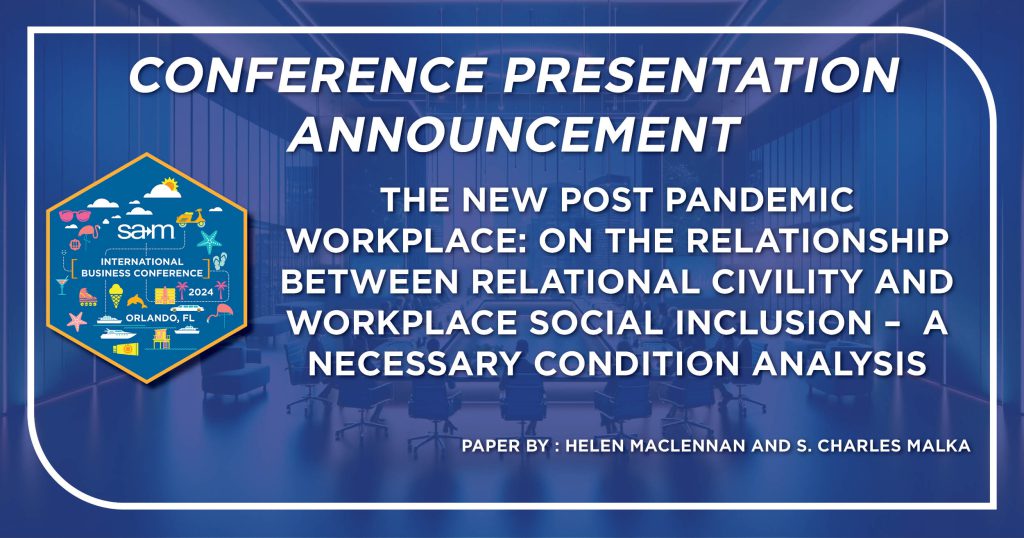
The programming committee for the 79th Annual SAM International Business Conference is pleased to announce the acceptance of the presentation, The New Post Pandemic Workplace: On the Relationship Between Relational Civility and Workplace Social Inclusion – A Necessary Condition Analysis by Helen Maclennan and S. Charles Malka.
In the rapidly evolving landscape of the post-pandemic workplace, organizational leaders are facing unprecedented challenges. The shift towards remote work has not only transformed how we connect and communicate but has also highlighted the critical issue of social isolation within the workforce. It’s a pivotal moment for management across the globe to reassess and innovate in the ways they foster workplace social inclusion. This pressing issue was the focus of a compelling academic paper presented at the recent Society for Advancement of Management (SAM) International Business Conference, an event renowned for showcasing groundbreaking research and strategies in the field of management.
The paper, a timely exploration into the emerging dynamics of workplace relationships in the digital age, delves into how the increasing reliance on remote work and digital communication platforms has heightened feelings of disconnection and disengagement among employees. The authors argue that the key to navigating this new reality lies in enhancing the quality of workplace social interactions with a concentrated effort on civility.
Employing the Workplace Relational Civility index (WRC) to measure dimensions of relational decency, culture, and readiness, the study provides an in-depth analysis based on a sample of 160 employees from various industries. The findings reveal a nuanced understanding of what it takes to foster a socially inclusive workplace in today’s environment. Notably, the research supports the hypothesis that relational decency and readiness are essential conditions for high levels of social inclusion, while relational culture may not be as critical as previously thought.
These insights are particularly relevant for organizational leaders and HR professionals seeking effective strategies to counteract the social isolation brought about by remote work. The study emphasizes the importance of civility and respectful interactions, suggesting that the future of workplace social inclusion depends significantly on our ability to cultivate an environment where every employee feels valued and connected, regardless of their physical location.
For managers, the implications are clear: to build a more inclusive workplace, focusing on the quality of social interactions is crucial. This involves not only implementing policies that encourage respectful and decent behavior but also creating opportunities for employees to develop meaningful connections and a sense of readiness to engage in positive workplace relationships.
The presentation at the SAM International Business Conference has sparked a vital conversation among business leaders and academics alike, highlighting the need for ongoing research and dialogue in this area. As the paper concludes, the journey towards fostering a more inclusive workplace is ongoing, with much to learn about the interplay between digital communication, remote work, and social inclusion.
As we look to the future, this research offers a roadmap for organizations aiming to navigate the complexities of the post-pandemic workplace. By prioritizing civility and focusing on the human aspects of work, we can overcome the barriers of distance and digital communication to create a more inclusive, connected, and engaged workforce.
The insights from this conference presentation are just the beginning. As the world of work continues to evolve, so too will our strategies for fostering an environment where every employee can thrive. The conversation on workplace social inclusion is more relevant than ever, and it’s up to us to continue it, with civility and connection at the heart of our efforts.
Join us online or in person at SAMIBC 2024 and see this great presentation and many more March 19 – March 23, 2024. For registration information visit www.samnational.org/conference.
